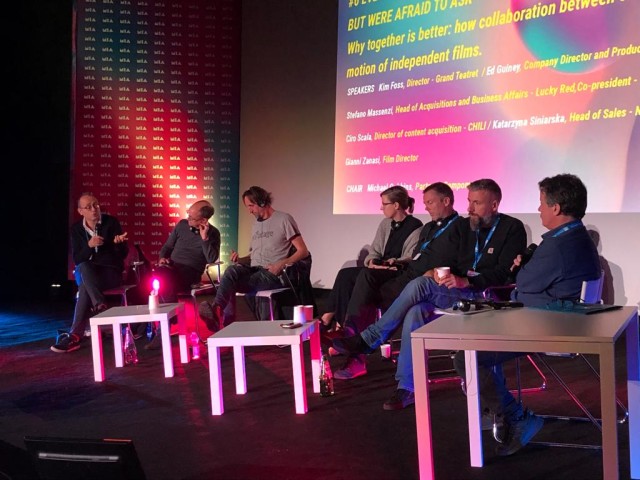Europa Distribution held its 13th Annual Conference in Rome (16-19 October) in the framework of the MIA Market, gathering around sixty members of the association to discuss about the latest evolutions in the European distribution market.
With an ever-increasing number of films released every year, and competition for audience’s attention getting tougher in the era of multiplication of contents, the need for joining forces across different parts of the film’s value chain has taken a central place in the current debate. Answering this call for action, Europa Distribution organised on 19 October a panel open to all MIA participants entitled “Why Together is Better: How collaboration between sectors can help the promotion of independent films.”
Michael Gubbins, Chair of the panel, opened the debate pointing out that indeed the European market is highly fragmented, composed as it is by different players. From producers and filmmakers, to sales agents, distributors, exhibitors and VoD platforms, each part of the value chain brings its own expertise to the table, and the European Film Industry must make sure that the tensions arising from each step is a positive one, that adds value to the chain.
Discussing about the specific role of film distribution, the Co-President of Europa Distribution Stefano Massenzi (Lucky Red, Italy) explained how distributors would be in the perfect position to collect information about the audience from the rest of the chain and help the industry to better understand what the audience want from cinema, but the issue of circulation of data still remains problematic. Another issue that according to Massenzi needs to be urgently tackled is education. “Children today learn how to swipe before they learn how to talk, the screen today is present in everybody’s life. We need to make sure that the audience is given the tools to make informed choices and this can only happen with film and media education.”
Answering directly to Massenzi’s remarks, the TVoD platform representative Ciro Scala (CHILI, Italy) agreed on the need of a collaborative approach on data. Founded in 2012 in Italy, CHILI is a transactional VoD platforms that also works in UK, Poland, Germany and Austria, and the company counts among its shareholders US studios such as Paramount, Sony and Warner Bros. In their business margins of profit for individual transactions are very low and in order to maintain a sustainable model, CHILI has soon started to differentiate its business, opening the platform to merchandise sale, creating its own film magazine and a geo-localized cinema ticket booking service. Scala announced that the company will be soon look into data monetization and they are eager to work with film distributors.
Taking the conversation back to the beginning of the value chain, Ed Guiney (Element Pictures, Ireland) discussed about production admitting that part of the problem lies right there. The current financing systems encourage producers to bet on quantity rather than on quality, which results in the production of huge amount of average and mediocre films. Guiney’s hope is that in the future producers will be more encouraged to select more carefully their projects, betting on fewer films with more talented creatives involved, and giving those films a real chance in the market supporting them fully in terms of budget and time.
Italian film director Gianni Zanasi (Lucia’s Grace, The Complexity of Happiness) also commented on the lack of exciting films in the current European market and he related that to the industry’s demand for filmmakers to always tick certain boxes. “My films have been in festivals like Cannes and Venice and this in the eyes of the industry automatically means that I need to follow the auteur standards: my posters should be dark and serious, and my films should not be fun”. Zanasi called for the industry to think outside the box, approaching films in a freer way, leaving space to the “inconsistencies” that mark real creative works.
Katarzyna Siniarska (New Europe Film Sales, Poland) argued that in many filmmakers’ career it might take a couple of mediocre films to get on the right track and produce their “gem”. The role of international sales agents is to support talents from an early point and sometimes protect them from the market’s pressure to round their edges. Over the past few years New Europe Film Sales has been also working with short films in order to keep an eye on emerging talents. The company has also recently started a talent campus with the aim of putting filmmakers in touch with international decision makers.
When it comes to the industry’s closest link with the audience, cinemas take the stage. Kim Foss, Managing Director of the Grand Teatret of Copenhagen (Denmark), insisted on the importance of creating tailored made events that can help creating a buzz around a film. “This is of course time consuming, but we can’t afford being lazy today. There is a reason why I am not a dentist: I love cinema and I can’t help doing overtime if that’s what it takes to make it work.”
The panel also discussed about Netflix’ films in cinemas and about windows, agreeing that, as Netflix seems to be changing its attitude towards theatrical releases, there can be a coexistence of the two models and that every case should be judged on an individual base. Respect of all parts of the value chain and across-sectors dialogue are key to create an efficient market.
During the MIA Market, members of Europa Distribution also worked in private round tables to discuss about several topics especially relevant in their every-day realities when it come to promote European films at best: the new MEDIA Selective and Automatic Scheme; Audience Development; Relationships with exhibitors and exhibition creative models and New Models of P&A.
“Let’s Talk” is Europa Distribution motto and the conversation about new models of film distribution will indeed continue. Next stop IDFA to talk about release strategies of documentary films.
